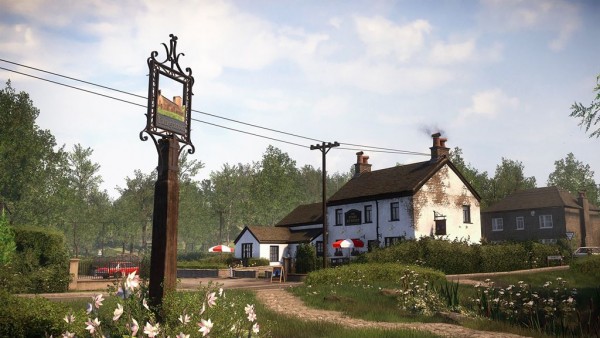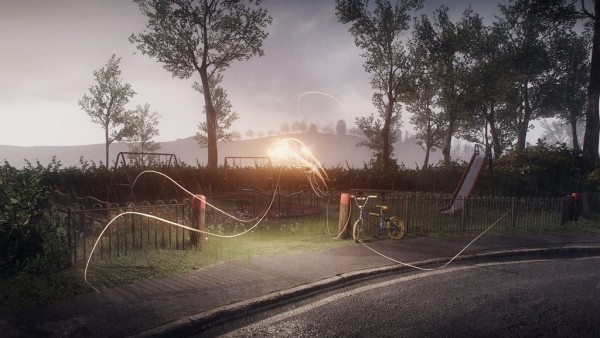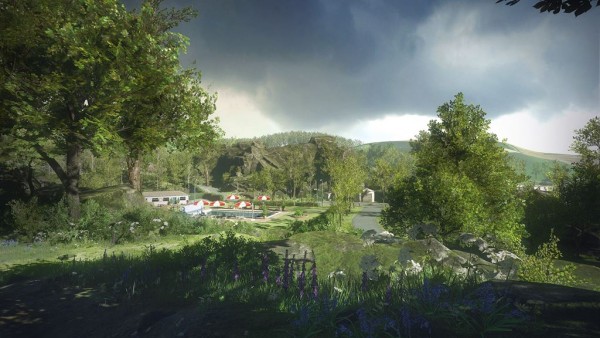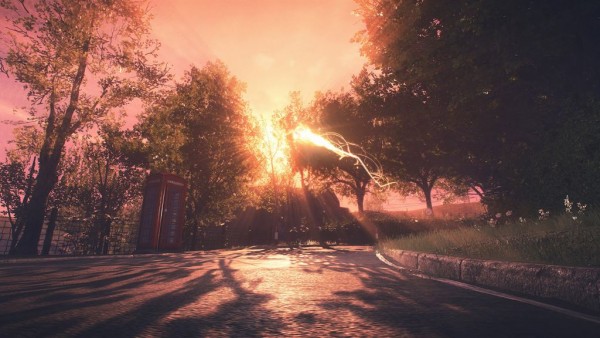Publisher: SCEA
Developer: The Chinese Room/SCE Santa Monica Studio
Medium: Digital
Players: 1
Online: No
ESRB: M
Our dried voices, when
We whisper together
Are quiet and meaningless
As wind in dry grass
or rats’ feet over broken glass
In our dry cellar
T.S. Eliot had it partly wrong, at least if you’re going by Everybody’s Gone To The Rapture. The world ends with a whimper, sure, but there’s more to it than that. There are also dead birds. Abandoned cars. Crumpled, bloody tissues. Packed suitcases sitting on beds, waiting for…someone.
Eyes I dare not meet in dreams
In death’s dream kingdom
These do not appear:
There, the eyes are
Sunlight on a broken column
There, is a tree swinging
And voices are
In the wind’s singing
More distant and more solemn
Than a fading star.
The end result, I guess, is the same. After the last spasm of humanity, after that whimper, the world is silent. That’s the thing that first hits you when you start playing Everybody’s Gone To The Rapture: it’s so quiet. There are none of the noises you associate with modern life, none of the sounds that most of us unthinkingly relegate to background noise: no cars, no computers, not even any buzzing lights. Just silence. There aren’t even any birds chirping, because they’ve all died.
This means, of course, that when you do hear sounds, they tend to stick with you. The few TVs and radios scattered throughout the game’s world are instantly noticeable, of course; as soon as one of them is nearby, you’ll know because of the crackling static and that weird, disembodied voice repeating numbers over and over again. There’s something deeply unnerving about walking into an abandoned house and hearing a hum that gets louder the closer you get.
And then there’s the music. Because Everybody’s Gone To The Rapture is such a quiet game, when the orchestral hymns start getting louder, you know you’re about to experience one of the game’s truly affecting moments. For me, at least, it didn’t become long before my responses became almost Pavlovian: the music would begin to swell, and instantly I’d start feeling tense and getting a little choked up because I knew what was coming.
Is it like this
In death’s other kingdom
Waking alone
At the hour when we are
Trembling with tenderness
Lips that would kiss
Form prayers to broken stone.
Of course, neither the music nor the rare ambient noises have anything on the dialogue. You may not see any people in Everybody’s Gone To The Rapture, but they’re there.
Or, more accurately, their echoes are there. As you walk around the empty village, every so often you’ll stumble across memories, and little scenes will play out in front of you. They may not make a lot of sense at first, but as you get further and further in you learn more about these characters: their loves, their betrayals, their heartbreaks, their sadness.
It’s all very stereotypically British, the way it’s portrayed. There are repressed feelings and quiet desperation, and lots of people never fully saying what they mean, with little bits of seething anger and indignation bursting through the surface every so often. Much like every other aspect of this game, it’s impossible not to feel the emotional resonance in every stutter, in every half-hearted mumble, in every sentence that’s cut off before the speaker can say what they want to say.
In this last of meeting places
We grope together
And avoid speech
Gathered on this beach of this tumid river
Sightless, unless
The eyes reappear
As the perpetual star
Multifoliate rose
Of death’s twilight kingdom
The hope only
Of empty men.
The game succeeds in all this, I suspect, because there aren’t any people. Where The Vanishing Of Ethan Carter’s sole failing was that the people didn’t look as realistic as everything else, Everybody’s Gone To The Rapture gets around that by simply not showing them. Instead, the game’s various characters are portrayed as bits of falling light. Considering how incredibly lifelike the world is, it was a smart choice, since it means there aren’t any jarring moments of seeing characters get stuck in the uncanny valley.
The light serves a broader purpose, too. Whether it’s being used to portray people or it’s simply off in the distance, flitting around, light acts like a beacon in this game, drawing you to certain points and underlining the important bits.
It’s hard not to ascribe some religious feeling to it, too. Between the light and the music and the story (and, obviously, the name) there’s an undercurrent of spirituality running through Everybody’s Gone To The Rapture. It may not be the text, of course. With the way the game balances the end of the world with people’s private dramas, it may not even be the subtext. But there’s no denying that it’s certainly there.
Between the idea
And the reality
Between the motion
And the act
Falls the Shadow
It’s important to realize that Everybody’s Gone To The Rapture isn’t exactly a game. Considering that its developers also made the equally non-game-like Dear Esther, this should come as no surprise. Rather, it’s essential you think of it as a story that you just happen to be experiencing on your PS4. Otherwise, it will just seem like a walking simulator in a nicely-rendered English country village, and then you’re just missing the point — and the beauty — of it all.
And there is ample beauty in Everybody’s Gone To The Rapture — beauty, and emotion, and death and love and life. It’s all here, and it’s all portrayed in such a way that it will stick with you long, long after you’ve put down your controller.
This is the way the world ends
This is the way the world ends
This is the way the world ends
Not with a bang but with a whimper.





